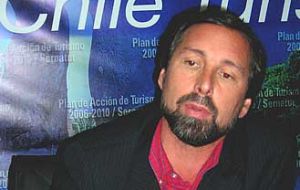MercoPress. South Atlantic News Agency
Chile's tourism policy is not massive but environment friendly
 Director of the Tourism Office, Oscar Santelices.
Director of the Tourism Office, Oscar Santelices. Growth of the tourism industry must be in parallel with a sustainable environment development which means Chile is not interested in massive tourism but rather in visitors who have a special interest in nature and wildlife, admitted the country's Director of the Tourism Office, Sernatur, Oscar Santelices.
"We're talking of tourists interested in visiting Patagonia, the fiords Cape Horn, Antarctica or the desert of Atacama in the north of the country", said Santelices in Lisbon, Portugal where he participated in the VII summit of the World Travel & Tourism Council, WTTC. "We're too far away from the large tourism markets so we can concentrate on an industry in parallel with sustainable environment development", said. Santelices adding that the niche Chile targets is a high income bracket which must disburse considerable funds to travel to South America. Santelices said that the Chilean supply of tourism packages must be selective and linked to areas such as culture, history, heritage, gastronomy, "quality products but also capable of ensuring tourism is sustainable, helps with conservation of the environment and benefits local communities". "Chile is actually seen by interested visitors from the developed world as an exotic destination, which limits the number of tourists, but also demands greater outlays from potential visitors". As to air links, Mr Santelices said that the relation with United States has improved significantly but not with the European Union, "because of the quotas"."The number of flights must be increased because Chile has become a final destination and not part of a flight schedule", he underlined. An estimated 700 tourism operators from airlines, hotels, catering and government officials were present at the Lisbon gathering which focused its agenda on the significant rate of increase of the industry, job creation and environment conservation. Addressing the closing session of the summit, President of the Republic of Portugal Anibal Cavaco Silva underlined the significance of the tourism industry which "represents 3% growth for developed countries economies and 7% for emerging markets such as China" "The industry serves as a powerful engine, boosting the sound development of local economy. In the meantime, we should achieve sustainability in the high-quality and fruitful tourism, contributing to the economic development of the whole world," President Silva said. During the summit WTTC announced "The 2007 Tourism for Tomorrow Awards", the highest accolade for best practice in travel and tourism development that are known as the "Oscars" of travel and tourism industry. It is handed out annually in four different categories, which are Destination Award, Conservation Award, Investor in People Award and Global Tourism Business Award. After rigorous evaluation by an international committee of tourism experts, the Destination Award was rewarded to Australia's Great Barrier Reef; Conservation Award to U.S. Aspen Skiing Company; Investor in People Award to Indonesia's Nihiwatu Resort, and Global Tourism Business Award to U.S. Lindblad Expeditions. WTTC is a forum for business leaders in the travel and tourism industry which among its members includes the CEOs from some one hundred of the world's leading travel and tourism companies. WTTC works to raise awareness of travel and tourism as one of the world's largest industries, employing approximately 230 million people and generating over 10% of world GDP.




Top Comments
Disclaimer & comment rulesCommenting for this story is now closed.
If you have a Facebook account, become a fan and comment on our Facebook Page!